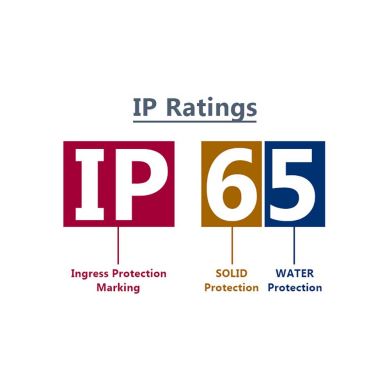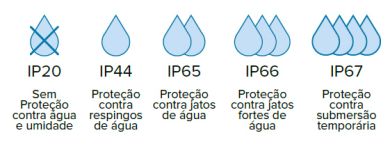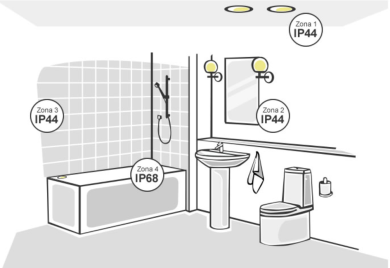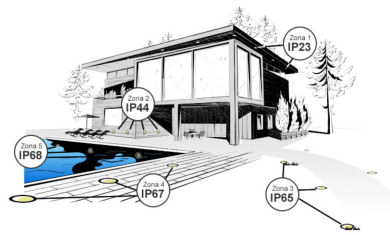IP: What is it and what is its importance in Lighting?

The Protection Index (IP) is an important aspect to consider when choosing the most suitable luminaires for your space, especially when it comes to bathrooms or outdoor areas. Learn how to interpret the value of the protection index and which one suits your needs in today's article.
The Protection Index, or IP for short, indicates the degree of protection of a given object, namely in relation to the impact of solid objects and contact with liquids. In summary, IP defines the degree of protection and waterproofing of a lamp, spotlight, projector, etc. against dirt and humidity.
It is an international standard, defined by the IEC 60529 standard.
The degree of protection is always indicated using two digits. The first is indicative of protection against the ingress of external solid agents, while the second indicates resistance to water.
The Protection Index, or IP for short, indicates the degree of protection of a given object, namely in relation to the impact of solid objects and contact with liquids. In summary, IP defines the degree of protection and waterproofing of a lamp, spotlight, projector, etc. against dirt and humidity.
It is an international standard, defined by the IEC 60529 standard.
The degree of protection is always indicated using two digits. The first is indicative of protection against the ingress of external solid agents, while the second indicates resistance to water.

Generally, it is established that the higher the IP grade, the more protected the lighting equipment will be. Thus, the lowest possible degree of protection will be IP00 and the highest IP68.
We can say that products with a degree of IP20, IP25 or IP33 are suitable for indoor installations. While products with IP44, IP54 or IP65 are suitable for outdoor installations. Additionally, products with IP68 are fully submersible, and therefore ideal for swimming pools.
As we previously indicated, the protection index is particularly significant when choosing bathroom and outdoor lighting. An electrical device that is not suitable may stop working or function incorrectly, which could bring you unnecessary trouble and inconvenience.
We can say that products with a degree of IP20, IP25 or IP33 are suitable for indoor installations. While products with IP44, IP54 or IP65 are suitable for outdoor installations. Additionally, products with IP68 are fully submersible, and therefore ideal for swimming pools.
As we previously indicated, the protection index is particularly significant when choosing bathroom and outdoor lighting. An electrical device that is not suitable may stop working or function incorrectly, which could bring you unnecessary trouble and inconvenience.

In a bathroom, the selected luminaires must be suitable for an area with humidity, something inherent to these rooms. Therefore, choosing devices with a suitable IP is essential for the proper functioning of the room.
Normally, a product with a medium IP, such as at least an IP44, is chosen for the general areas of the bathroom and a product with a high IP, such as IP68, for the bath or shower area, which is naturally exposed the water.
Normally, a product with a medium IP, such as at least an IP44, is chosen for the general areas of the bathroom and a product with a high IP, such as IP68, for the bath or shower area, which is naturally exposed the water.

In an outdoor area, the selection of suitable lighting, with the right degree of protection, which protects the luminaire from the weather and humidity from the outside, is one of the most important aspects during lighting planning.
In ground floor areas, it is recommended that wall luminaires have at least an IP44, while floor luminaires must have at least an IP65. As for spaces with a pool, an IP67 is recommended for floor-standing luminaires and an IP68 is a mandatory requirement for luminaires submerged inside the pool.
